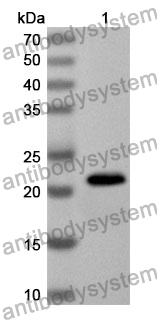Catalog No.
PHN29501
Species reactivity
Human
Host species
Rabbit
Isotype
IgG
Clonality
Polyclonal
Immunogen
E. coli - derived recombinant Human PHLDA1 (Ser137-Gln305).
Tested applications
ELISA: 1:4000-1:8000, IHC: 1:50-1:100, WB: 1:1000-1:4000
Target
Proline- and histidine-rich protein, T-cell death-associated gene 51 protein, Pleckstrin homology-like domain family A member 1, PQR protein, Apoptosis-associated nuclear protein, PHRIP, PHLDA1, Proline- and glutamine-rich protein, TDAG51, PQ-rich protein
Purification
Purified by antigen affinity column.
Accession
Q8WV24
Applications
ELISA, IHC, WB
Form
Liquid
Storage buffer
0.01M PBS, pH 7.4, 50% Glycerol, 0.05% Proclin 300.
Stability and Storage
Use a manual defrost freezer and avoid repeated freeze thaw cycles. Store at 2 to 8°C for frequent use. Store at -20 to -80°C for twelve months from the date of receipt.
Silencing of the PHLDA1 leads to global proteome changes and differentiation pathways of human neuroblastoma cells., PMID:38495105
Androgen receptor expression in epidermal and adnexal tumours., PMID:33478823
Systems analysis identifies potential target genes to overcome cetuximab resistance in colorectal cancer cells., PMID:30719834
Lewis(y) antigen-mediated positive feedback loop induces and promotes chemotherapeutic resistance in ovarian cancer., PMID:30066907
GD2 ganglioside-binding antibody 14G2a and specific aurora A kinase inhibitor MK-5108 induce autophagy in IMR-32 neuroblastoma cells., PMID:30027525
PHLDA1 Mediates Drug Resistance in Receptor Tyrosine Kinase-Driven Cancer., PMID:29490281
Downregulation of the PHLDA1 gene in IMR-32 neuroblastoma cells increases levels of Aurora A, TRKB and affects proteins involved in apoptosis and autophagy pathways., PMID:27278006
Primitive follicular induction in molluscum contagiosum., PMID:26265178
Gene expression markers of efficacy and resistance to cetuximab treatment in metastatic colorectal cancer: results from CALGB 80203 (Alliance)., PMID:25520391
Expression Patterns of Gli-1, Pleckstrin Homology-Like Domain, Family A, Member 1, Transforming Growth Factor-β1/β2, and p63 in Sebaceous and Follicular Tumors., PMID:25473223
Modulation of stemness in a human normal intestinal epithelial crypt cell line by activation of the WNT signaling pathway., PMID:24534551
Targeting GD2 ganglioside and aurora A kinase as a dual strategy leading to cell death in cultures of human neuroblastoma cells., PMID:23962557
TDAG51 is induced by homocysteine, promotes detachment-mediated programmed cell death, and contributes to the cevelopment of atherosclerosis in hyperhomocysteinemia., PMID:12738777
Identification of the human PHLDA1/TDAG51 gene: down-regulation in metastatic melanoma contributes to apoptosis resistance and growth deregulation., PMID:12384558
A proline- and glutamine-rich protein promotes apoptosis in neuronal cells., PMID:10428057
Protein kinase C regulates Fas (CD95/APO-1) expression., PMID:9725212

